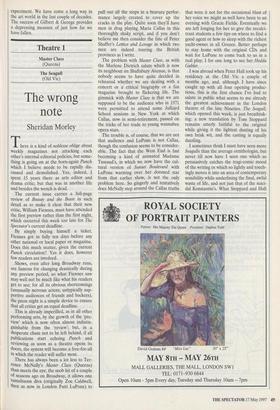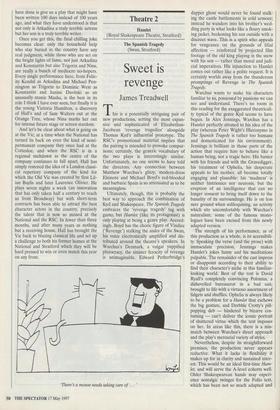Theatre 1
Master Class (Queens) The Seagull (Old Vic)
The wrong note
Sheridan Morley
There is a kind of noblesse oblige about weekly magazines not attacking each other's internal editorial policies, but some- thing is going on at the born-again Punch which I believe needs to be rapidly dis- cussed and demolished. Yes, indeed, I spent 15 years there as arts editor and drama critic; but that was in another life and besides the wench is dead.
The current issue carries a full-page review of Beauty and the Beast in such detail as to make it clear that their new critic, William Fiennes, must have attended the first preview rather than the first night, which occurred this week too late for The Spectator's current deadline.
By simply buying himself a ticket, Fiennes got in fully ten days before any other national or local paper or magazine. Does this much matter, given the current Punch circulation? Yes it does, however few readers are involved.
. Shows, even after long Broadway runs, are famous for changing drastically during any preview period, so what Fiennes saw may well not be much like what his readers get to see; for all its obvious shortcomings (unusually nervous actors, untypically sup- portive audiences of friends and backers), the press night is a simple device to ensure that all critics get an equal deadline.
This is already imperilled, as in all other performing arts, by the growth of the `pre- view' which is now often almost indistin- guishable from the 'review'; but, in a desperate chase not to be left behind, if all publications start echoing Punch and reviewing as soon as a theatre opens its doors, the system will become a free-for-all in which the reader will suffer most.
There has always been a lot less to Ter- rence McNally's Master Class (Queens) than meets the eye; the snob hit of a couple of seasons ago on Broadway, it allows one tumultuous diva (originally Zoe Caldwell, then as now in London Patti LuPone) to pull out all the stops in a bravura perfor- mance largely created to cover up the cracks in the play. Quite soon they'll have men in drag playing Maria Callas in this thoroughly shaky script, and if you don't believe me then consider the fate of Peter Shaffer's Leuice and Lovage in which two men are indeed touring the British provinces as I write.
The problem with Master Class, as with the Marlene Dietrich salute which is now its neighbour on Shaftsbury Avenue, is that nobody seems to have quite decided in rehearsal whether we are dealing with a concert or a critical biography or a fan magazine brought to flickering life. The gimmick with Master Class is that we are supposed to be the audience who in 1971 were permitted to attend some Julliard School sessions in New York at which Callas, now in semi-retirement, passed on the tricks of her trade to young wannabee opera stars.
The trouble is, of course, that we are not that audience and LuPone is not Callas, though the confusion seems to be consider- able. The fact that the West End is fast becoming a kind of animated Madame Tussaud's, in which we now have the cul- tural version of Sunset Boulevard with LuPone warming over her doomed star from that earlier show, is not the only problem here. So gingerly and tentatively does McNally step around the Callas truths that were it not for the occasional blast of her voice we might as well have been to an evening with Gracie Fields. Eventually we are left longing for her to give the recalci- trant students a few tips on where to find a good agent or how to sleep with the richest yacht-owner in all Greece. Better perhaps to stay home with the original CDs and wait for LuPone to come back to us in a real play; I for one long to see her Hedda Gabler.
I was abroad when Peter Hall took up his residency at the Old Vic a couple of months ago, and, although I have since caught up with all four opening produc- tions, this is the first chance I've had to salute in public what seems to me already the greatest achievement in the London theatre of the late Nineties. The Seagull, which opened this week, is just breathtak- ing: a new translation by Tom Stoppard remains utterly faithful to the original while giving it the lightest dusting of his own brisk wit, and the casting is equally dazzling.
I sometimes think I must have seen more Seagulls than the average ornithologist, but never till now have I seen one which so persuasively catches the tragi-comic mood of the writing or which so lightly and touch- ingly moves it into an area of contemporary sensibility while underlining the final, awful waste of life, and not just that of the suici- dal Konstantin's. What Stoppard and Hall have done is give us a play that might have been written 100 days instead of 100 years ago, and what they have understood is that not only is Arkadina a truly terrible actress but her son is a truly terrible writer.
Once you get this, the final chilling joke becomes clear: only the household help who stay buried in the country have any real judgment, while those who are set on the bright lights of fame, not just Arkadina and Konstantin but also Trigorin and Nina, are really a bunch of mediocre no-hopers. Every single performance here, from Felic- ity Kendal as Arkadina and Michael Pen- nington as Trigorin to Dominic West as Konstantin and Janine Duvitski as an unusually -.manic Masha, is the best in its role I think I have ever seen, but finally it is the young Victoria Hamilton, a discovery of Hall's and of Sam Walters out at the Orange Tree, whose Nina marks her out for intense future stage or screen stardom.
And let's be clear about what is going on at the Vic; at a time when the National has turned its back on even the kind of semi- permanent company they once had at the Cottesloe, and when the RSC is in a regional meltdown as the centre of the company continues to fall apart, Hall has simply restored the idea of a London classi- cal repertory company of the kind for which the Old Vic was created by first Lil- ian Baylis and later Laurence Olivier. He plays seven nights a week (an innovation that has only taken half a century to reach us from Broadway) but with short-term contracts has been able to attract the best character actors in the country, precisely the talent that is now so missed at the National and the RSC. In fewer than three months, and after many years as nothing but a receiving house, Hall has brought the Vic back to blazing classical life and set up a challenge to both his former homes at the National and Stratford which they will be hard pressed to win or even match this year on any front.



































































 Previous page
Previous page